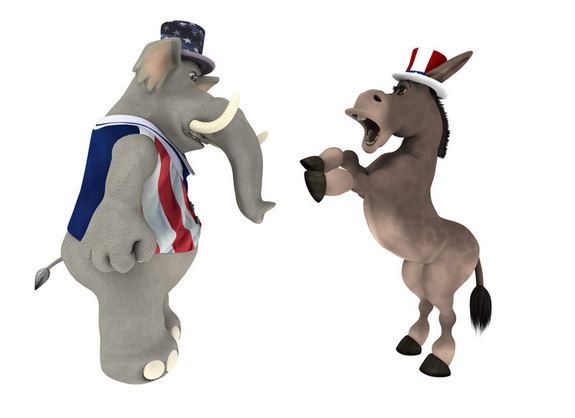How US Politics Is Broken

NEW YORK — For all of their differences, liberals and conservatives seem to agree on one thing: politics in America is broken.
"What the public wants doesn't get reflected in what happens in Washington," said Jeffrey Sachs, director of the Earth Institute at Columbia University, at an event Friday (April 19) on Columbia's campus. The way "politics has been taken over by powerful groups absolutely has to change in this country," Sachs said.
Sachs, who is Special Advisor to United Nations Secretary-General Ban Ki-moon on the Millennium Development Goals, and former Congressman Joe Scarborough (R-Fla.), host of the MSNBC show Morning Joe, discussed some of these problems here at an event entitled, "A Conversation on America's Future."
Illustrating the sorry state of politics, both panelists pointed to hot-button issues and recent events. Earlier this week, the U.S. Senate failed to pass a bill that would require background checks for gun buyers, even though the majority of Americans support gun reforms, polls show. The nation continues to battle a crippling national debt, as politicians continue to debate a solution. And health-care costs remain sky-high, in spite of attempts to reform the system. [7 Great Dramas in Congressional History]
Gun control blocked
Following the gun control bill's defeat, Scarborough lambasted his fellow Republicans — and some Democrats —for their role in blocking the bill. "We're talking about passing a bill that 90 percent of Americans support that would simply require background checks to make sure people aren't gang members, make sure they aren't terrorists, make sure they aren't convicted felons, make sure they aren't violent past offenders. Who can be against that?" Scarborough said.
Republicans need to stand up to the extremists in their party, Scarborough said. "I've always criticized liberals for being too weak," he said, but "it's Republicans now who are cowering in the corner."
Sign up for the Live Science daily newsletter now
Get the world’s most fascinating discoveries delivered straight to your inbox.
The vote on gun control reflects a pervasive theme across politics, Sachs said. "We've seen that Americans want us out of wars, for example, and yet the wars continue. We've seen Americans […] want higher taxes on rich people, but that of course hasn't happened. The American people were disgusted by what Wall Street perpetrated, and every day we see more crimes being settled [out of court]," said Sachs, referring to the corruption of Wall Street executives.
Skyrocketing costs
When it comes to tackling the national debt, both Republicans and Democrats harbor fantasies, Sachs said: Republicans think cutting taxes is the best way to stimulate the economy, whereas Democrats think spending money is the way to go.
Scarborough said he would happily spend "$3 trillion" on a stimulus bill if it were investing more heavily in rebuilding America's infrastructure, and supporting a new generation of scientists like the ones that put a man on the moon. These things would resurrect the economy, Scarborough said, but he claimed the government's stimulus package has failed to do that.
Both Scarborough and Sachs also agreed that politics has failed in health care. The problem is two-fold, Sachs said, with progress on one issue stopping progress on the other. First of all, the United States is one of the only high-income countries where you can't be assured of health care. "We've had a solid 10 or 15 percent of Americans that are without coverage, and they somehow falls through the cracks." Secondly, the United States has the most expensive health-care system in the world, Sachs said — the United States spends way more per capita per year on health care than other countries. "The prices are out of site and out of control," Sachs said.
In 2000, the United States spent an average of $4,500 per person on health care compared with Switzerland, which spent an average of $3,300 per person, after adjusting the per capita spending rates to international dollars, according to the University of California, Santa Cruz, Atlas of Global Inequality.
The problem with "Obamacare," Sachs said, was that Obama was completely focused on the first problem — providing universal access to health care — which he addressed "by sacrificing almost anything on the second problem [i.e., the costs]," Sachs said. Lowering costs would be unpopular with pharmaceutical companies, whose support Obama needed to pass his bill, Sachs said. The power of lobbyists is "crazy," he added. "If you let special interest groups determine politics, you have to do things in the back room because it's so ugly."
Given how the system is broken, "we have to try to find that heart of decency again in American politics," Sachs said.
Follow Tanya Lewis on Twitter and Google+. Follow us @livescience, Facebook & Google+. Original article on LiveScience.com.











